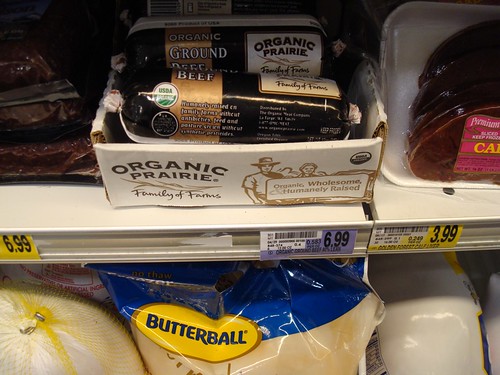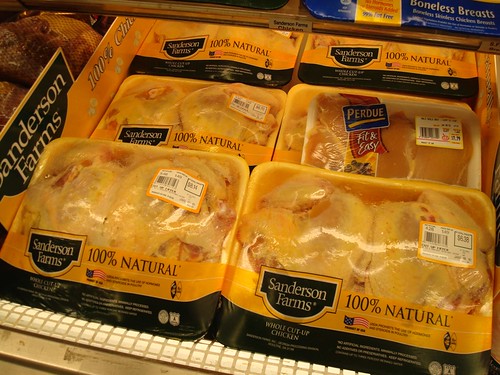after eating dinner, we went to grocery stores.
and really didn't even buy anything (except for muffins for breakfast the next morning.)
(we live fascinating lives, people.)
it was actually for research purposes. we went to two grocery stores--lowes food and harris teeter--that we typically only visit for special items or when they're having huge sales (triple coupon week at HT, for example) and compared their organic/natural selections and prices with the stores we normally shop (for me, kroger on a good day, food lion in a pinch.)
now, harris teeter does have these nice little signs and color-coded price tags for their organic items...
 and "natural" items--we've figured out that "natural" means minimal processing, but not certified organic. it still isn't specific about hormones or antibiotics in most cases, so i'm a little wary of "natural," but better than conventional, i guess.
and "natural" items--we've figured out that "natural" means minimal processing, but not certified organic. it still isn't specific about hormones or antibiotics in most cases, so i'm a little wary of "natural," but better than conventional, i guess.
sadly, the only organic beef found in HT were these frozen 12 oz tubes for $7. not even a pound, and frozen? no, thank you. i'll stick with my laura's lean beef from kroger for that price.
 over at lowe's foods, we scouted out similar options in the meats and produce. more "natural" options included sanderson farms, who actually had a list of common terms and definitions from packaging and labels on their website to explain their products to consumers.
over at lowe's foods, we scouted out similar options in the meats and produce. more "natural" options included sanderson farms, who actually had a list of common terms and definitions from packaging and labels on their website to explain their products to consumers. but this one--well, this one stumped us. it may be hard to read the labels, but the eggs on the left are "cage free." the eggs on the right are "vegetarian fed." which one is better? do you want chickens that have been fed a non-vegetarian diet (and one can only imagine what that may include) but have been allowed access to the outdoors? or ones that have been fed vegetarian feed but have (presumably) been kept in a chicken house without the ability to roam?
but this one--well, this one stumped us. it may be hard to read the labels, but the eggs on the left are "cage free." the eggs on the right are "vegetarian fed." which one is better? do you want chickens that have been fed a non-vegetarian diet (and one can only imagine what that may include) but have been allowed access to the outdoors? or ones that have been fed vegetarian feed but have (presumably) been kept in a chicken house without the ability to roam?
i just don't know.
in the midst of our "research," justin also ran across an article about genetically modified foods that included the major corn seed company featured in food, inc. that led us to this shopping guide of non-genetically modified foods (GMO--o is for organisms) and a comprehensive list of companies and brands that do not use GMOs in their products. and this section of the website explains why you should avoid GMOs (if the whole "organ damage in rats" from the huffington post article didn't get to you.)
he also surprised me with a copy of "food rules" (mentioned in our first post)--and i've gotten a kick of out many of the rules.
"if it came from a plant, eat it. if it was made in a plant, don't."
"it's not food if it's called by the same name in every language. (think big mac, cheetos or pringles.)"
"don't get your fuel from the same place your car does."
"don't eat anything your great-grandmother wouldn't recognize as food."
and we're working on rule #28--"if you have the space, buy a freezer."
which is important since we just placed our first order for the spring run market, to include several pounds of chicken and beef from the local farms. we just need more freezer space in general, and we're left with the decision of buying a small freezer and continuing to save for our backyard fence--or buying a big freezer and replacing my 5 year old washer/dryer with a stackable set to open up space in the laundry room. that's a tough decision--because for the record, i really really want a fence. the day when i can just open up the back door and let pepper out to do her business is a good day in my book.
so that's where we are. anyone else have some stories on trying to buy organic or natural in the grocery stores?
















